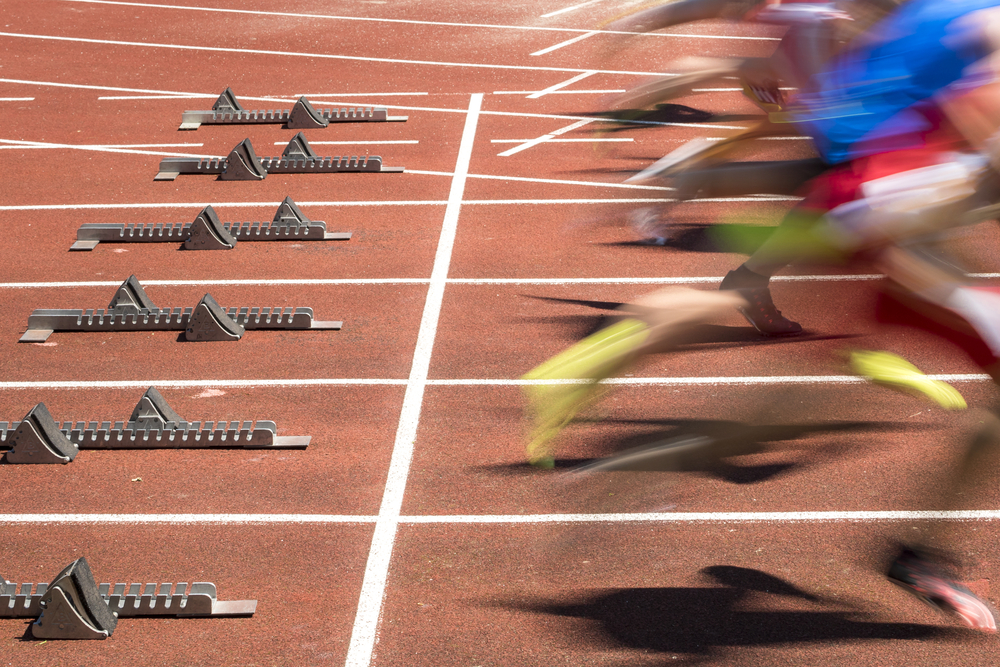We all, to some extent, walk around with an image of ourselves in our own heads. We have, let’s say, a self-conception. You see yourself as a certain kind of person, and I see myself as a certain kind of person.
I bring this up because my own self-conception gets punctured a little every time the Olympics roll around. I think of myself as a fairly rational, high-brow, cosmopolitan sort of person. I see myself as the sort of person who lives according to sensible motives; I don’t succumb to biased tribal loyalties.
In line with this self-conception, I don’t care about sporting events. What does it matter to me if my university wins or loses? I’m not on either team, I don’t gain anything if FSU wins a football game. So yes, I am indeed one of those obnoxious and self-righteous people who a) does not care about sports and b) has to fight feelings of smug superiority over sports fans who indulge their tendencies to tribalism.
This is not to say I don’t have my loyalties: I’m reliably on team dog rather than cat, and I track election forecasts with an obsessive fervor equal to any sports fanatic. But I tell myself that, in both cases, my loyalty is rational.
“I’m on team dog because there are good reasons why dogs make better pets.”
“I track elections because something important is at stake, unlike in a sports game.”
These are the sorts of lies I tell myself in order to maintain my self-conception as a rational, unbiased sort of person. By the end of this post, I hope to convince you that these are, in fact, lies.
The Olympic Chink
The first bit of evidence that I’m not as unbiased as I’d like to think, comes from my interest in the Olympics. I genuinely care about how the U.S. does in the Olympics. For example, I was disappointed when, for the first time in fifty years, the U.S. failed to medal day one.
Nor do I have any clever story for why this bias is rational. While I think there is a strong case to be made for a certain kind of moral patriotism, my desire to see the U.S. win the most Olympic medals is not a patriotism of that sort. Nor do I think that the U.S. winning the most medals will have important implications for geopolitics; it is not as though, for example, the U.S. winning more medals than China will help demonstrate the value of extensive civil liberties.
Instead, I want the US to win because it is my team. I fully recognize that if I lived in Portugal, I’d be rooting for Portugal.
But why do I care if my team wins? After all, everything I said earlier about sports is also true of the Olympics. Nothing in my life will be improved if the U.S. wins more medals.
Turning to Psychology
To answer this question, we need to turn to psychology. It turns out that humans are hardwired to care about our in-group. Perhaps the most famous studies demonstrating the effects of in-group bias come from the social psychologist Henri Tajfel.
In one study, Tajfel brought together a group of fourteen- and fifteen-year-old boys. Tajfel wanted to know what it would take to get people invested in ‘their team.’ It turns out, it barely requires anything at all.
Tajfel first had the boys estimate how many dots were flashed on a screen, ostensibly for an experiment on visual perception. Afterwards the boys were told that they were starting a second experiment, and that, to make it easier to code the results, the experimenters were dividing the boys into subgroups based on if they tended to overestimate or underestimate the number of flashed dots (in actual fact the subgroups were random). The boys were then given the chance to distribute rewards anonymously to other participants.
What Tajfel found was that the mere fact of being categorized into a group of ‘overestimators’ or ‘underestimators’ was enough to produce strong in-group bias. When distributing the reward between two members of the same group, the boys tended to distribute the reward fairly. However, when distributing between one member of the in-group and one member of the out-group, the boys would strongly favor members in their same group. This was true even though there was no chance for reciprocation, and despite participants knowing that the group membership was based on something as arbitrary as “overestimating the number of dots flashed on a screen.”
Subsequent results were even more disturbing. Tajfel found that not only did the boys prioritize their arbitrary in-group, but they actually gave smaller rewards to people in their own group if it meant creating a bigger difference between the in-group and out-group. In other words, it was more important to treat the in-group out-group differently than it was to give the biggest reward to members of the in-group.
Of course, this is just one set of studies. You might think that these particular results have less to do with human nature and more to do with the fact that lots of teenage boys are jerks. But psychologists have found tons of other evidence for strong in-group biases. Our natural in-group bias seems to explain phenomena as disparate as racism, motherlove, sports fandom, and political polarization.
Sometimes this in-group bias is valuable. It is good if parents take special care of their children. Parental love provides an extremely efficient system to ensure that most children get plenty of individualized attention and care. Similarly, patriotism is an important political virtue, it motivates us to sacrifice to improve our nation and community.
Sometimes this in-group bias is largely benign. There is nothing pernicious in wanting your sports team to win, and taking sides provides a source of enjoyment for many.
But sometimes this in-group bias is toxic and damaging. A nationalistic fervor that insists your own country is best, as opposed to just your own special responsibility, often leads people to whitewash reality. In-group bias leads to racism and political violence. Even in-group sports fandom sometimes results in deadly riots.
A Dangerous Hypocrisy
If this is right, then it is unsurprising that I root for the U.S. during the Olympic games. What is perhaps much more surprising is that I don’t care about the results of other sporting games. Why is it then, if in-group bias is as deep as the psychologists say it is, that I don’t care about the performance of FSU’s football team?
Is my self-conception right, am I just that much more rational and enlightened? Have I managed to, at least for the most part, transcend my own tribalism?
The psychology suggests probably not. But if I didn’t transcend tribalism, what explains why I don’t care about the performance of my tribe’s football team?
Jonathan Haidt, while reflecting on his own in-group biases, gives us a hint:
“In the terrible days after the terrorist attacks of September 11, 2001, I felt an urge so primitive I was embarrassed to admit it to my friends: I wanted to put an American flag decal on my car. . . . But I was a professor, and professors don’t do such things. Flag waving and nationalism are for conservatives. Professors are liberal globetrotting universalists, reflexively wary of saying that their nation is better than other nations. When you see an American flag on a car in a UVA staff parking lot, you can bet that the car belongs to a secretary or a blue-collar worker.”
Haidt felt torn over whether to put up an American flag decal. This was not because he had almost transcended his tribal loyalty to the US. Rather he was being pulled between two different tribal loyalties. His loyalty to the US pulled him one way, his loyalty to liberal academia pulled the other. Haidt’s own reticence to act tribally by putting up an American flag decal, can itself be explained by another tribal loyalty.
I expect something similar is going on in my own case. It’s not that I lack in-group bias. It’s that my real in-group is ‘fellow philosophers’ or ‘liberal academics’ or even ‘other nerds,’ none of whom get deeply invested in FSU football. While I conceive of myself as “rational,” “high-brow,” and “cosmopolitan”; the reality is that I am largely conforming to the values of my core tribal community (the liberal academy). It’s not that I’ve transcended tribalism, it’s that I have a patriotic allegiance to a group that insists we’re above it. I have an in-group bias to appear unbiased; an irrational impulse to present myself as rational; a tribal loyalty to a community united around a cosmopolitan ideal.
But this means my conception of myself as rational and unbiased is a lie. I have failed to eliminate my in-group bias after all.
An Alternative Vision of Moral Education
But we seem to face a problem. On the one hand, my in-group bias seems to be so deep that even my principled insistence on rationality turns out to be motivated by a concern for my in-group. But on the other hand, we know that in-group bias often leads to injustice and the neglect of other people.
So what is the solution? How can we avoid injustice if concern for our in-group is so deeply rooted in human psychology?
We solve this problem, not by trying to eliminate our in-group bias, but rather by bringing more people into our in-group. This has been the strategy taken by all the greatest moral teachers throughout history.
Consider perhaps the most famous bit of moral instruction in all of human history, the parable of the Good Samaritan. In this parable, Jesus is attempting to convince the listening Jews that they should care for Samaritans (a political out-group) in the same way they care for Jews (the political in-group). But he does not do so by saying that we should not have a special concern for our in-group. Rather, he uses our concern for the in-group (Jesus uses the word ‘neighbor’) and simply tries to bring others into the category. He tells a story which encourages those listening to recognize, not that they don’t have special reasons to care for their neighbor (their in-group), but to redefine the category of ‘neighbor’ to include Samaritans as well.
This suggests something profound about moral education. To develop in justice, we don’t eliminate our special concern for the in-group. Instead we expand the in-group so that our special concern extends to others. This is why language like ‘brotherhood of man’ or ‘fellow children of God’ has proven so powerful throughout history. Rather than trying to eliminate our special concern for family, it instead tries to get us to extend that very same special concern to all human beings.
This is why Immanuel Kant’s language of the ‘Kingdom of Ends’ is so powerful. Rather than trying to eliminate a special concern for our society, instead we recognize a deeper society in which all humans are members.
The constant demand of moral improvement is not to lose our special concern for those near us, but to continually draw other people into that same circle of concern.



